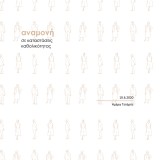The present research paper deals with the concept of waiting in material and intangible space that depends on time and human existence. The absence of one of the above results in the malfunction of this condition, as they are interdependent and it would not be possible for one to exist without the existence of the other. More specifically, it is studied, through a diary record, when waiting through anunexpected condition takes on dimensions of universal interest.
This study is carried out through daily and experiential observation during a global health crisis. This treaty has put entire cities, and consequently people around the world, on pause and stagnation, which represents waiting. A waiting that is characterized by vague time data and has reversed the already familiar roles of spaces and activities. Public space is being abolished, so houses and balconies are now our personal waiting areas.
The obligation to remain inactive for an unknown period of time abolishes any kind of temporality. Every kind of desire and plans for the future are overlooked and attention is focused on the waiting. Consequently, by introducing the human presence, it is observed that each individual seeks to protect his personal space and is called upon to cope with the condition of social distancing.
At the same time, with the assistance of a catalog, an attempt is made to categorize the tricks and mechanisms created or used by individuals within the limits of their residence, in order to smoothly develop the expectation.
Efforts have been made to redefine the waiting condition, but it produces states and so the body stands waiting, staying and enduring.
